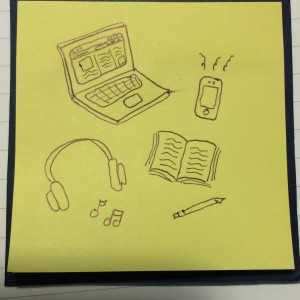How often have you had this happen…you’re at work, or doing homework, or doing something that requires your focus and attention. And it’s hard, or tedious, and you’re feeling frustrated or a little bored. And suddenly you think, “Hey, I wonder what’s new on Facebook?” or “I should see if so-and-so has replied to my email yet,” or you get a text, and then off you go to check Facebook or your email or your phone, and 10 minutes later you finally remember that you’re supposed to be working, and you drag yourself back to the task at hand? Or you get distracted because you’ve got music playing and you hear that song you really like and start singing along? Or you have the TV on in the background and you realize you’ve stopped chopping the vegetables to watch a particularly dramatic scene?
Yep, I bet you’ve had some of these things happen…and probably more than once. I know I have! All of these situations are examples of multitasking (multitasking can either mean you are doing two or more things simultaneously, or switching back and forth between tasks). In American culture these days, it’s becoming very common to have music playing, email or Facebook open, your phone on, maybe even the TV, or be playing a computer game (or all of the above!). And it’s not really a big deal to stop what we’re doing to reply to a text or an email, or watch a few minutes of TV, right?
Depending on what you’re doing, it’s probably a bigger deal than most of us would like to think. A new study of middle school, high school, and college students1 found that on average, students doing homework at home only stayed on task for about 6 minutes before switching to some other activity (usually something else on their phone or computer). Overall, they only managed to stay on task for about 65% of the time. Activities like homework, studying, learning during a lecture, and GPA all appear to be negatively affected by multitasking with technology in particular (although these days that’s the most common way that we all multitask, and the younger you are, the more you do it). And if you don’t have homework on your plate these days, and think you’re off the hook – think again. Other researchers2 have suggested that our productivity might drop as much as 40% when we multitask. Our recall and understanding suffer, and tasks actually take us longer. Even though we think we’re functioning just fine and being efficient…we’re not.
When you really need to get something done, make it easier on yourself, not harder! Here are things you can do if you’d like to improve your productivity and decrease some of those multitasking distractions.
- Turn off the TV and the music, or at least turn the volume down
- Turn off your phone’s ringer, or put it in airplane mode. Or even better, put it in airplane mode and put it out of sight
- Set your email program so that you don’t get an alert when a new message comes in (I did this at work last week and it is definitely helping me focus better)
- Close any windows you’re not working on (Facebook, email, games, etc.) so that it’s harder to switch to something else when your attention wanders (Which it will! I can’t tell you how many times I checked my email while I was writing this, until I finally took my own advice and closed that window!)
- Commit to focusing for a short amount of time (between 15-25 minutes) and putting off all distractions until the timer goes off. If it’s too much temptation to have your phone out as your timer, use a kitchen timer, and tell yourself that whatever text or notification you get on your phone, it can wait until the timer goes off!
1Carrier, Rosen, Cheever, and Lim. (2015) “Causes, Effects, and Practicalities of Everyday Multitasking,” Developmental Review.


